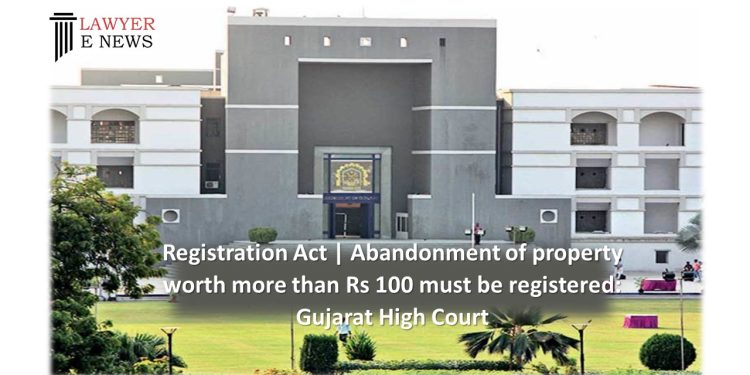Registration Act | Abandonment of property worth more than Rs 100 must be registered: Gujarat HC

D.D:09/06/2022
The Registration Act of 1908, the Gujarat High Court has determined that if a property right worth more than Rs. 100 has been surrendered or extinguished, it must be registered with the registering authority.
In the absence of such registration, such a relinquishment cannot affect any immovable property included therein, and the document cannot be accepted as evidence of any transaction affecting such property or conferring such authority, it was stated.
The Bench comprised of Justice Umesh Trivedi was hearing a petition under Article 227 in which the Petitioner had challenged an order passed by the Principal Civil Judge dismissing her share in her father’s allegedly acquired by the State of Gujarat property.
The Petitioner stated that after the demise of her father, the compensation for acquisition was awarded to Respondent No. 4.1, i.e. her brother, who together with the Petitioner was in charge of the reference proceedings. In addition to refusing to recognise her 50% share of the awarded compensation, the executing court also denied her application.
The High Court noted that she and her brother were both claimants throughout the entire reference case, and that at no point did her brother oppose her entitlement to the compensation award. Nonetheless, during the pendency of the execution proceedings, the Respondent opposed the grant of her share based on the Petitioner’s 2011 affidavit waiving her rights to the properties.
The Petitioner relied primarily on Section 17(1)(b) of the Registration Act of 1908, which mandates that the relinquishment of right must be registered if the value of the property is undisputedly greater than Rs. 100. Section 49 was also mentioned, which states that if a document requiring mandatory registration is not registered, it cannot be used as evidence in any transaction involving the property.
It was argued that the 2011 relinquishment deed could not be considered in this case because it had not been registered under the Act of 1908.
Contrarily, Respondent No. 4.1 argued that the Petitioner had voluntarily relinquished her right to the property and, as a result, she was ineligible to receive any amount awarded as a result of the property’s acquisition.
Affirming the Petitioner’s argument, the Bench remarked that Section 49 required mandatory registration, which was lacking in the instant case. Regarding the release deed, the Supreme Court stated:
“However, since the document, an affidavit relinquishing rights in specific properties, does not indicate that she has relinquished her right to all of her father’s properties, which she inherited, nor is it a document relating to any family arrangement between the parties, its registration is not required. Thus, the document on which respondent No. 4.1 relies to deny her the right to compensation for her share cannot be taken into account at all.”
Consequently, the High Court ordered the Reference Court to evaluate Petitioner’s share and issue an appropriate order in the subsequent execution proceedings.
MADHUKANTABEN D/O SOMABHAI SHANKARBHAI PATEL
Versus
STATE OF GUJARAT






